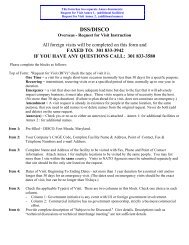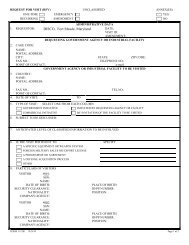DSS ACCESS, Volume 1, Issue 3 - Defense Security Service (DSS)
DSS ACCESS, Volume 1, Issue 3 - Defense Security Service (DSS)
DSS ACCESS, Volume 1, Issue 3 - Defense Security Service (DSS)
Create successful ePaper yourself
Turn your PDF publications into a flip-book with our unique Google optimized e-Paper software.
ackground check<br />
<strong>Security</strong> clearance requests<br />
Rejected for lack of information<br />
By Phu Nguyen<br />
<strong>Defense</strong> Industrial <strong>Security</strong> Clearance Office<br />
Incomplete information is the most common reason why<br />
security clearance application packages are rejected by either<br />
the <strong>Defense</strong> Industrial <strong>Security</strong> Clearance Office (DISCO) or the<br />
Office of Personnel Management (OPM).<br />
Incomplete information could be the subject failing to indicate<br />
the company submitting the investigation request is their<br />
current employer; missing fingerprint cards; subject failing to<br />
provide identifying information for relatives born abroad; or<br />
subject failing to provide Selective <strong>Service</strong> registration<br />
information or legal exemption.<br />
To expedite the security clearance process,<br />
applicants and security officers should<br />
ensure all forms are completed and<br />
contain accurate information.<br />
They should also familiarize<br />
themselves with how a<br />
properly rolled set of<br />
fingerprints should look,<br />
and when possible, list<br />
references located in<br />
the United States<br />
who can verify<br />
overseas activities.<br />
Turn the page to see<br />
charts identifying<br />
the most common<br />
reasons investigations<br />
are rejected by DISCO<br />
and OPM and how to<br />
correct them.<br />
http://www.dss.mil —— 15




